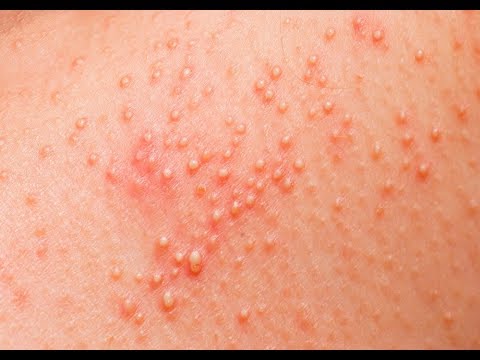There are many natural remedies that you can use for rashes and itching caused by allergens or skin conditions. The natural remedies in this video can provide relief from an itchy rash or skin allergies.
Apple Cider Vinegar
Apple cider vinegar is a common kitchen staple that has soared in popularity thanks to its ability to treat a whole host of different ailments. It’s great for people dealing with eczema as it may help with the skin’s acidity levels. Apple cider vinegar also helps with inflammation and infection.
The antimicrobial properties of apple cider vinegar can help with bacteria on the skin, while the vinegar rebalances the skin’s pH. This may benefit the skin’s moisture levels and help with symptoms of eczema.
To use apple cider vinegar as a natural treatment, place a cup of vinegar in your bath and soak for twenty minutes. Make sure you rinse your skin with cool water afterward to get rid of any excess vinegar on the skin.
You can also mix apple cider vinegar with coconut oil to make a homemade moisturizer. Mix one tablespoon of apple cider vinegar with a cup of coconut oil. This dilutes the vinegar enough so that won’t be too harsh on your skin.
Oatmeal Bath
Oatmeal baths are a common household remedy to help soothe skin. Oatmeal has anti-inflammatory properties and can help the skin to retain moisture, reducing itchiness and flaking of the skin. Oatmeal creates a barrier on the skin that protects against harmful bacteria, and helps balance the skin’s pH levels.
Many skin products use colloidal oatmeal as an ingredient. Colloidal oatmeal is made from finely ground oats, and can be added to your own creams and lotions. Oatmeal has been found to work well for people with sensitive skin, as it doesn’t contain harsh additives. But it does contain plenty of the good stuff, including lipids, proteins, and enzymes. Oats and oat products are recommended for people who suffer from eczema and psoriasis.
To make an oatmeal bath, grind whole oats into a fine powder using a coffee grinder, food processor, or blender. Fill your bathtub with warm water and add in a cup of ground oats. You can put the oats in a cheesecloth or pantyhose if you don’t want to clean up your bathtub afterward.
Soak in the oatmeal mixture for fifteen to twenty minutes, then apply a gentle moisturizer after getting out of the bath.
Aloe Vera
Aloe vera can be used to help relieve itching and skin rashes. Aloe vera gel is mostly made up of water, but contains antioxidants that help keep the skin moisturized. Aloe vera also has properties that help with inflamed skin and healing wounds. This makes it a good option as a treatment for skin rashes and conditions where the skin is cracked or broken. Aloe vera can also help with itching sensations.
Aloe vera gel straight from the plant is safe to use on your skin, and can help with eczema, dry skin, sunburns, bug bites, and psoriasis. Apply the gel to the affected area and leave it on. Repeat as needed.
Coconut Oil
Lauric acid is one of many medium-chain fatty acids found in virgin coconut oil. Lauric acid has antimicrobial properties that can help prevent infections, treat acne, and soothe inflamed skin. Lauric acid also helps the skin absorb the moisturizing elements of virgin coconut oil.
Some research has found that virgin coconut oil may help boost the skin’s moisture levels, especially for people with eczema. The anti-inflammatory benefits of coconut oil also help soothe the discomfort of rashes.
As coconut is a tree nut, it’s important to check that you’re not allergic to this but before applying it to your skin, to prevent any potential allergic reactions. Try a coconut oil patch test if you’ve never applied coconut oil to your skin before.
To use coconut oil to help with rashes and itchy skin, apply the oil to slightly damp skin twice a day. This is easy to do after taking a shower or a bath, and you can combine the oil with other treatments.
source







